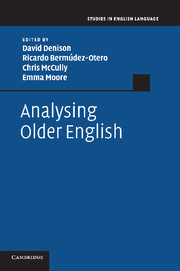Book contents
- Frontmatter
- Contents
- Figures and maps
- Tables
- Contributors
- General introduction
- Part I Metrics and onomastics in older English
- Part II Writing practices in older English
- Part III Dialects in older English
- 8 Introduction to Part III
- 9 Levelling and enregisterment in northern dialects of late Modern English
- 10 Quantitative historical dialectology
- 11 Reconstructing syntactic continuity and change in early Modern English regional dialects
- Part IV Sound change in older English
- Part V Syntax in older English
- References
- Index
11 - Reconstructing syntactic continuity and change in early Modern English regional dialects
the case of who0
Published online by Cambridge University Press: 05 December 2011
- Frontmatter
- Contents
- Figures and maps
- Tables
- Contributors
- General introduction
- Part I Metrics and onomastics in older English
- Part II Writing practices in older English
- Part III Dialects in older English
- 8 Introduction to Part III
- 9 Levelling and enregisterment in northern dialects of late Modern English
- 10 Quantitative historical dialectology
- 11 Reconstructing syntactic continuity and change in early Modern English regional dialects
- Part IV Sound change in older English
- Part V Syntax in older English
- References
- Index
Summary
Introduction
In recent years, dialect syntax has started to attract more wide-ranging interest among both synchronic and diachronic linguists. This aspect of regional variation used to be a neglected area in traditional dialectology largely because of the methods of data collection and elicitation used (for overviews, see Kortmann 2006; Adger and Trousdale 2007). In variation studies methodological problems have been created by the extension of the notion of the linguistic variable to higher-level grammatical variation (cf. Lavandera 1978; Romaine 1984a). However, comparative dialect studies, such as Tagliamonte (2002, 2008), show that a case can be made not only for tracing regional differences in syntactic changes in progress but also for quantitative differences in factors conditioning these processes across varieties. The role of frequency as a measure of variation is generally acknowledged in work on variety grammars. Using probabilistic models to corpus data, subtle but significant variation can be detected between regional and areal varieties of a given language (Bresnan 2007; Bresnan et al. 2007).
Until recently, regional variation in early Modern English (1500–1700) was considered to fall beyond the reach of empirical research. This narrowing of research scope after the Middle English period, ‘notoriously the time when linguistic variation is fully reflected in the written mode’ (Horobin and Smith 2002: 33), has been attributed to the standardisation of spelling, which made texts largely unlocalisable after 1500 (McIntosh, Samuels and Benskin 1986: 3). This ‘bad data’ problem has been felt particularly acutely in the reconstruction of phonological variation.
- Type
- Chapter
- Information
- Analysing Older English , pp. 159 - 184Publisher: Cambridge University PressPrint publication year: 2011



